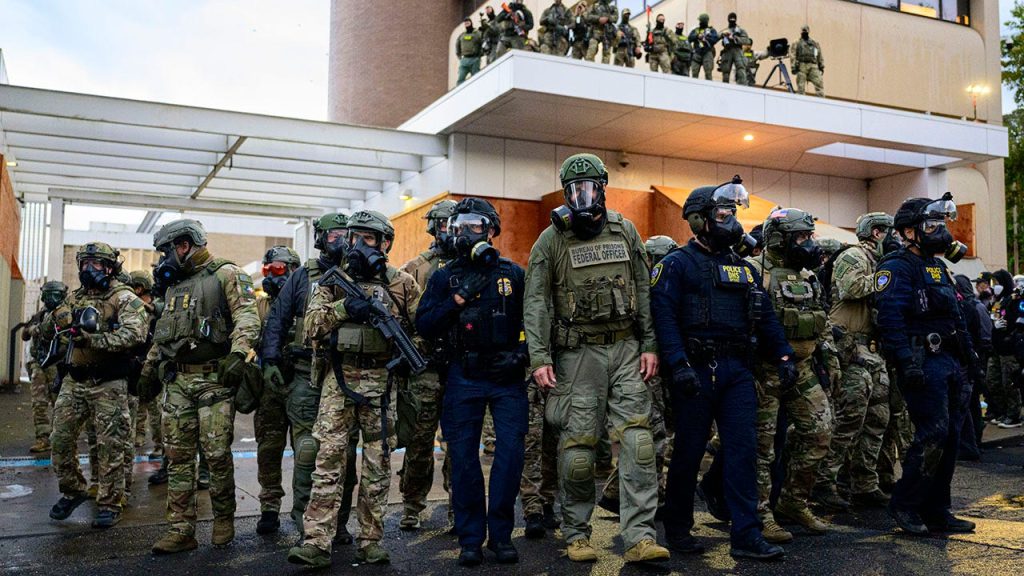Federal Judge Blocks Trump Administration’s National Guard Deployment to Portland
In a significant legal rebuke to the Trump administration, a federal judge has ruled that the attempted deployment of National Guard troops to Portland, Oregon, violated constitutional principles. The comprehensive 106-page ruling, issued Friday by U.S. District Court Judge Karin Immergut, permanently blocks the administration’s efforts to federalize and deploy National Guard members from Oregon, Texas, and California to Portland. This decision marks a definitive stance on the limits of presidential authority in deploying military forces domestically without appropriate justification or local consent.
The legal battle began when Defense Secretary Pete Hegseth authorized sending approximately 200 National Guard troops to Portland in September, ostensibly to protect the U.S. Immigration and Customs Enforcement (ICE) building amid ongoing protests. This move prompted immediate legal challenges from both the city of Portland and the state of Oregon, who argued that the federal government had overstepped its bounds. Judge Immergut, who was notably appointed by former President Trump himself, initially issued a temporary restraining order against the deployment, which she has now made permanent after conducting a three-day trial examining whether the Portland protests constituted sufficient grounds for military intervention under federal law.
At the heart of the court’s decision was the finding that the Trump administration failed to demonstrate a legitimate basis for deploying military forces domestically. Judge Immergut determined that the evidence presented did not support the administration’s claim that there was a rebellion or threat of rebellion that local authorities couldn’t handle. The ruling specifically noted that Oregon’s governor had objected to the deployment, and federal officials responsible for protecting the ICE building had not requested military assistance. This lack of coordination with state and local authorities appeared particularly problematic in the court’s analysis, highlighting tensions between federal intervention and state sovereignty.
The constitutional implications of the ruling are significant, as Judge Immergut explicitly found the deployment order violated the Tenth Amendment, which reserves to states any powers not expressly delegated to the federal government in the Constitution. This ruling reinforces the principle of federalism that has been central to American governance since the nation’s founding, establishing clear limits on the federal government’s ability to override state authority, particularly regarding law enforcement matters. The decision also reflects broader concerns about the appropriate use of military forces in domestic contexts, an issue that has become increasingly contentious in recent years amid protests across the country.
The Portland case is not isolated, as the administration faces similar legal challenges elsewhere. In Chicago, another judge has temporarily barred the administration from deploying troops, suggesting a pattern of judicial skepticism toward federal military intervention in local policing matters. These rulings collectively indicate that courts are closely scrutinizing the legal justifications for such deployments and are unwilling to grant the executive branch unfettered discretion in this domain. The Portland Police had notably accused federal troops of inflaming tensions at the anti-ICE protests, contradicting the administration’s assertion that military intervention was necessary to restore order.
While the Trump administration retains the option to appeal Judge Immergut’s decision to a higher court, the ruling represents a significant setback to its approach to civil unrest. The White House had previously rebuked the temporary injunction as “egregious,” indicating strong disagreement with judicial limitations on executive authority in matters of domestic security. However, the detailed nature of Judge Immergut’s final ruling, which carefully examined both the factual circumstances in Portland and the relevant constitutional principles, presents a formidable challenge to any appeal. The case ultimately highlights the ongoing tension between federal authority and state rights in responding to civil unrest, a balance that courts continue to refine through decisions like this one.


